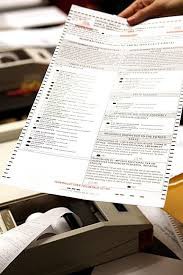[{
"name": "Ad - Medium Rectangle CC01 - 300x250",
"id": "AdMediumRectangleCC01300x250",
"class": "inlineCenter",
"insertPoint": "8",
"component": "2963441",
"requiredCountToDisplay": "12"
},{
"name": "Ad - Medium Rectangle LC01 - 300x250",
"id": "AdMediumRectangleCC01300x250",
"class": "inlineCenter",
"insertPoint": "18",
"component": "2963441",
"requiredCountToDisplay": "22"
},{
"name": "Ad - Medium Rectangle LC09 - 300x250",
"id": "AdMediumRectangleLC09300x250",
"class": "inlineCenter",
"insertPoint": "28",
"component": "3252660",
"requiredCountToDisplay": "32"
}]
San Luis Obispo is the latest local city facing a demand to change how it elects its City Council members.
A November demand letter submitted to the city by Santa Barbara-based attorney Robert Goodman alleges that SLO's current "at-large" election system violates the California Voting Rights Act.
In the letter, issued on behalf of client Jamie Gomez, Goodman threatens a lawsuit if the city doesn't transition to "by-district" elections.
Dozens of California cities—including Paso Robles, Grover Beach, Arroyo Grande, and Santa Maria—have received similar threats and demands to adopt by-district models.
"Under the district election process, cities are divided into geographic districts for the purpose of electing City Council members," a Dec. 5 city press release stated. "Candidates must live in the district in which they are seeking election, and only voters living in the district may vote for their City Council person."
SLO's current system—where all residents vote for their preferred City Council candidates no matter their place of residence—has the effect of diluting minority voters' influence on City Council elections, according to Goodman's allegations.
In SLO's press release, the city expressed disagreement with the demand letter and said it had negotiated an extended deadline of Jan. 31, 2020, to try to agree on a path forward and avoid litigation.
Most municipalities that have faced the same legal threats—including the cities on the Central Coast—ultimately decided to adopt the model change. The courts have ruled against cities in the cases that wound up in litigation.
SLO hopes an alternative model, like a ranked choice election, could satisfy both parties. A ranked choice election allows voters to vote for second-preference candidates—which then get tallied for all candidates who don't earn an outright majority vote.
"The city intends to analyze the factual basis of the claim," read the press release, "and pursue talks with plaintiffs about alternative paths to resolution that may achieve even greater diversity and inclusion in city elections." Δ
Latest in News
Readers also liked…
-

Coast Unified teachers upset over new position's salary and qualifications
Oct 20, 2022 -

SLO police identify alleged driver who hit and killed couple
Dec 22, 2022 -

When the levee breaks: Oceano residents, county officials walk a tightrope of regulations to manage Arroyo Grande Creek, which some say led to the levee's failure in January
May 18, 2023










